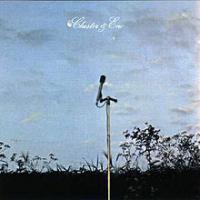Cluster & Eno: Eno Seeks Country Krautrock Comfort
When he joined the group onstage, his visual flamboyance drew focus from group leader Bryan Ferry. The friction between the two became too great and Eno left the band to pursue a solo career. Cut to 1976. Eno travels to the small, rural town of Forst to visit Hans-Joachim Roedelius and Dieter Möbius a duo known as Cluster. At the time they had just ended their association with Michael Rother in a group called Harmonia, whose album Deluxe, among others had exerted a profound influence on Eno's musical thinking. These albums were long on ambience and flowing, gentle melodies and short on the pounding 4/4 rhythms that infused the more industrial offshoots of the genre influenced by the urban industrialization of the post WWII era.
Eno spent less than two weeks with the duo, making music, cooking and even caring at times for Mr. Roedelius's baby. The recordings made during this collaboration, originally thought lost, weren't released until 1997.
In June of 1977 Eno re-joined the Cluster duo in Conny Plank's Berlin studio (Plank began as Marlene Dietrich's sound engineer) for a series of collaborations that resulting in this album and After the Heat, both of which were originally issued on the German Sky label (Sky 010, Sky 021). Plank's "house sound" was uncompressed and spacious, which suited perfectly the ambient experiments of Cluster and Eno.
It's open to question how much Eno actually contributed to the these sessions. Some think his greatest contribution was to act more as a catalyst than as a performer but regardless, the results are hypnotic, mesmerizing, other-worldly and entrancing. These two albums sold remarkably well at the time considering the experimental nature of the music and have continued to attract new generations of ambient/minimalist pleasure seekers.
If you're a David Bowie fan, you can hear the influences on side two of Low to which Eno contributed and of course on Eno's masterpiece Another Green World and on side two of Before and After Science.
If you enjoy those dreamy excursions Eno called "sky music" and "water music" respectively, you'll enjoy this album, which is more ambient on side one and with the addition of a drum, slightly more rhythmic on side two.
While I'm pleased that 4 Men With Beards has chosen to reissue this semi-obscure but influential minimalist masterpiece, I'm afraid that the sound on the reissue misses the mark in terms of, of all things, ambience. The original's three dimensional spaciousness is lacking on the reissue, which offers flattened perspectives and a literalness that reduces greatly the original's mystery. With the decay foreshortened the textural delicacy disappears.
"Die Bunge," track 3 side 2, which features a sarod or another drone-like instrument suffers the most. With all of the space dried up, the light touch turns to cacophony. The ebb and flow and gentle thrust of the next tune, "One," goes missing.
I'd say Sky either sent a CD or a digital file from which this was cut by an anonymous mastering engineer. It's not terrible. It's just not great. Couple that with a mediocre 180g pressing (at least mine was) that has some serious "no-fill" that sounds like a collision plus some noise and this record makes the case for the CD about as well as any uncaringly produced vinyl reissue can. The only care that went into it was the choice in the first place, but that's just not good enough.
Be sure to read both parts of the Eno feature Perfect Masters Thrive on Disasters—Eno's Rock Albums, Part I originally published in The Tracking Angle.
Perfect Masters Thrive on Disasters—Eno's Rock Albums, Part 2



